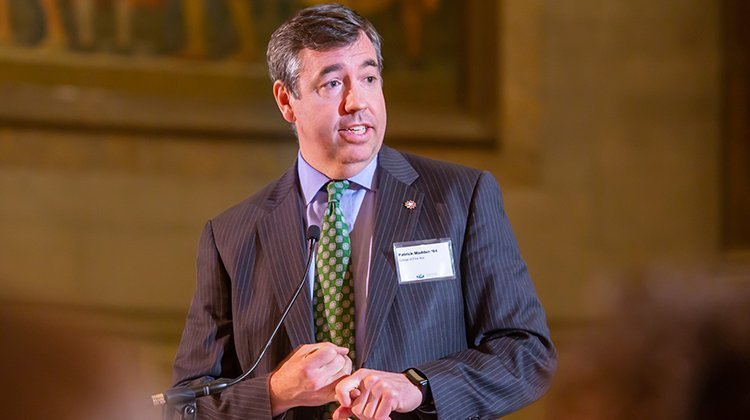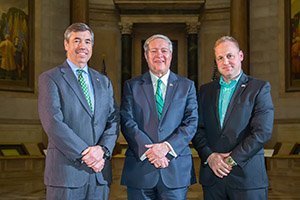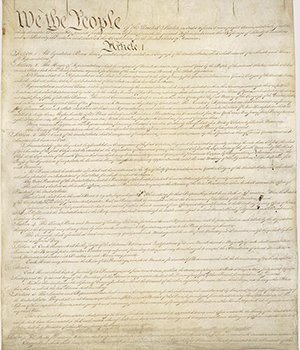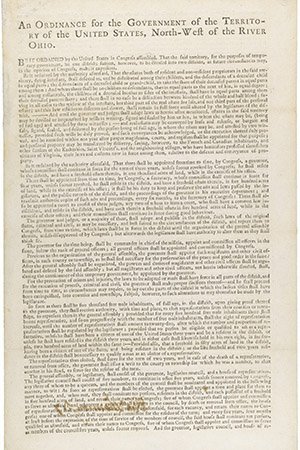Alumnus works to make sure the stories of America, its people are preserved and accessible

Patrick Madden, BMUS ’94, MA ’96, addresses a small group of OHIO alumni in April at the National Archives in Washington, D.C. Photo by Brad Lowe/Pixelme Studio
Ohio University alumnus Patrick Madden, BMUS ’94, MA ’96, gets to spend his workdays surrounded by the documents that define the history of the United States: The Declaration of Independence, the Constitution, and the Bill of Rights. For six years he’s served as executive director of the National Archives Foundation in Washington, D.C.—ensuring that these and all documents held within the Archives are available to the public.
“If it weren’t for this building and the documents within it, we wouldn’t have the country that we have today,” Madden said.
Lessons learned at OHIO continue to inform Madden’s work as a non-profit leader and his passion for the public’s documents: from the Declaration to the individual service records of every individual man and woman who has served in the U.S. armed forces.
Ohio Today news recently caught up with Madden who reflected on his time at OHIO, his work, and the unique place that is the National Archives.

Ohio University alumnus Patrick Madden, President M. Duane Nellis and Vice President of University Advancement Nico Karagosian pose just outside the National Archives Rotunda, which houses the Declaration of Independence, U.S. Constitution, and Bill of Rights—the most closely protected pieces of paper on the planet. Photo by Brad Lowe/Pixelme Studio
What lessons learned at OHIO stick with you?
I learned many life lessons at OHIO, but two that stick with me are:
First, get involved with a group or activity. It can be related to your major or just something you are passionate about – either way it is a terrific way to meet more people and add to your college experience.
Second, talk to your professors. Whether it is before/after class or office hours, professors are interested in their students’ success and perspective on the topic they teach. Building a rapport with your teachers will open up opportunities (internships, projects outside of class, maybe a job).
The professors in the School of Music were very supportive of my interests throughout my time at OHIO in and out of the classroom. That collaborative and encouraging approach is something I’ve brought to my professional life as a colleague and an executive.
What organizations and clubs were you involved in, and what’s your fondest OHIO memory outside of the classroom?
I was a leader in Phi Mu Alpha Sinfonia (professional music fraternity) and Pi Kappa Alpha. I was on staff forThe Postas a graphic designer and was a DJ for WOUB-FM in grad school. It is hard to pick a “fondest” OU memory—there are many. One of my most fun memories is that each Valentine’s Day our music fraternity chapter would organize afundraiser where we delivered serenades all over campus and Athens. We had a blast every year.
Do you have a favorite object or exhibit at the Archives? If so, what is it and why?
There are over 15 billion paper records as well as miles of film and video in the National Archives, so there are many to choose from. A few of the mostinspiring are: the only original signed Declaration of Independence, George Washington’s personal copy of the Constitution with handwritten notes in the margins, the cancelled $7.2 million check that the U.S. paid to Russia for Alaska, and the ‘receipt’ for the last American POW to come back at the end of the Vietnam War, to name a few.
My great-grandfather’s citizenship certificate from when he emigrated from Ireland has great personal meaning to me.

Pictured is the Constitution of the United States of America. Photo courtesy of the National Archives
What do you want people to know about the documents in the Archives and how they can access them?
The records of the National Archives are available in person to anyone over the age of 14 in Washington, D.C., or at any of the 40-plus presidential libraries and regional research facilities around the country. If you can’t visit our historic home in Washington, D.C., I encourage students and alumni to visitarchives.govand explore our holdings online. You can even help the Archives make the records more accessible by participating in our Citizen Archivist program. Pick a record and transcribe it online. Many of the records from our country’s founding are in beautiful cursive handwriting; however, most students can’t read cursive. So, in addition to digitizing records to make them accessible online, we are also transcribing them so anyone can read what they say.
Do you have a favorite moment or memory of guestsreally understanding why the Archives areimportant to our nation and to its people?
The best “a-ha” moments are when visitors make a personal connection to the document. If you ever wrote a letter to a president in school, your letter is in the National Archives. If your grandfather, uncle, or mother served in the military, their service record is in the National Archives. The one universal document that is so emotionally powerful is the Emancipation Proclamation. As individuals step up for their turn to view it and read Abraham Lincoln’s handwriting and choice of words, theybegin to cry. It is very moving and very personal.

Pictured is the Northwest Ordinance of 1787, which established Ohio University. Photo courtesy of the National Archives
If OHIO graduates want to see the Northwest Ordinance of 1787, which established the American Western University that we now know as Ohio University,how would they do that?
Certain documents in the Archives hold a special significance in telling the story of our country’s history. The Northwest Ordinance, passed before the Bill of Rights, is one of those records. To ensure the availability of these for all future generations, the preservation requirements do not make readily available to request and view in person. In order to provide public access to thedocument, the Archives has digitized it. I encourage those who are interested to read itonlineand feel the connection that OU has with the founding years of our country.
The importance of education was paramount to the Founders. There are many references to education in the Founders’ letters and our early documents. They believed an informed and active citizenry was vital to the health and future of the democracy.In 1789, Jefferson famously wrote “…whenever the people are well-informed,they can be trusted with their own government…” So, it is no surprise that OHIO carries the legacy that was framed in the Northwest Ordinance.
What would you like OHIO alumni and friends to know about the Archives plans for the centennial of the 19th Amendment? Or, any other upcoming events, programs at the Archives?
Launching this month and on view through December 2020, the National Archives will celebrate the centennial of the 19th Amendment—women’s right to vote. Rightfully Hers: American Women and the Vote is the story of the decades-long fight to achieve the right to vote and how passage in 1919 was merely one accomplishment of the on-going suffrage movement. Millions of women still could not vote after the 19th Amendment, and the past 100 years shows how many issues still persist in the struggle for women’s equality. Our initiative includes a major exhibition on display in D.C., a national traveling exhibition, and nearly 2,000 pop-up displays going to classrooms and libraries in all 50 states. More information can be found at archivesfoundation.org/women.
I encourage alumni to explore the National Archives—in D.C., around the country at Presidential Libraries andregional research facilities, or online where you can discover everything from the founding documents to wacky declassified videos of spaceships the military once tried to build! The Archives holds our country’s story. But more importantly, the Archives holds each family’s personal story.
Everyone can discover a bit of their ownpersonalhistory by exploring the Archives. We have citizenship records, ship logs, census records, Freedman’s Bureau files, all of the military service records, and many other documents that can connect you not only to your family’s past but also how your family is part of our country’s story.
To read more articles about Ohio University alumni, click here.
